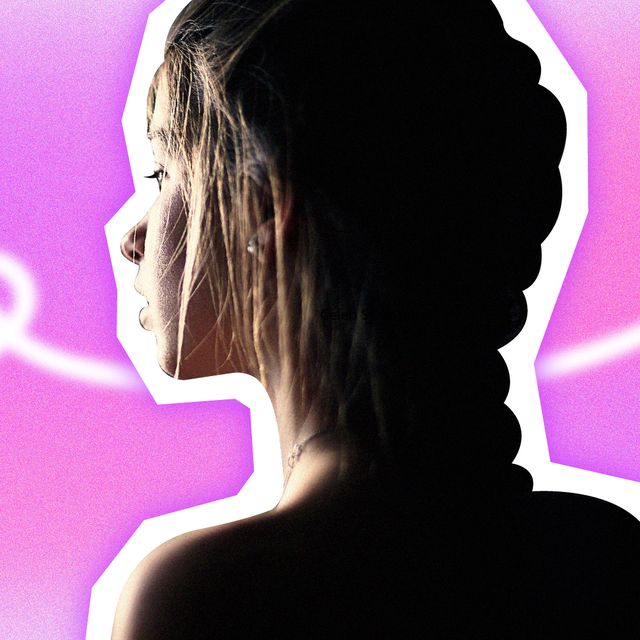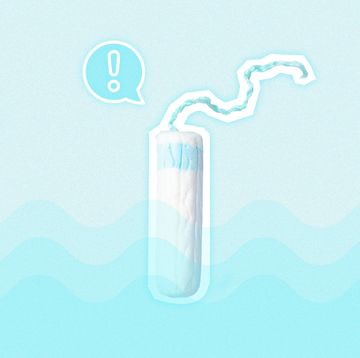Between TikTok, Instagram, and Twitter, there are so many different outlets for individuals to share their mental health struggles and for therapists to impart their expert advice. It's likely that you've seen a range of information presented on depression, anxiety, eating disorders, and other conditions, given the tremendous volume of posts dedicated to this content — on TikTok alone, the hashtag #mentalhealth has generated over 26 billion views. #Mentalhealthawareness has amassed over 7 billion, while a resource-centered hashtag, #mentalhealthbooks, has accumulated over 8 billion views.
Not everyone's experience with mental health issues is the same, so you might realize that there's a lot of competing information on your FYP or Twitter feed. Social media is also full of people spreading misinformation, including individuals without credentials branding themselves as “wellness experts.” This can create a harmful web of misconceptions about mental health conditions that might deter those struggling from asking for help. But breaking down these myths is a step towards tearing down the stigma surrounding mental health and fostering a community of acceptance. To help sort through the facts and the fiction, Dr. Anisha Patel-Dunn, Chief Medical Officer at LifeStance Health, Dr. Neha Chaudhary, Chief Medical Officer of BeMe Health and child and adolescent psychiatrist at Harvard Medical School, and Amira Johnson, LMSW, a mental and behavioral clinician at Berman Psychotherapy in Atlanta, identify the most common mental health myths and explain what you really need to know.
1. Mental health issues are not common
“Mental health conditions are extremely common and the rates of conditions like anxiety and depression are actually on the rise for kids and teens,” explains Dr. Chaudhary.
Due to virtual learning and months-long, isolating shutdowns, the COVID-19 pandemic has shed a significant light on how many young people suffer from mental health conditions. Dr. Patel-Dunn’s organization, LifeStance Health, reports that from July 2019 to July 2021, there was a 200 percent increase in youth patients — ages 17 and under — seeking mental health services. Dr. Chaudhary has seen a similar escalation in patients. “I've seen teens who didn't have any conditions [before the pandemic] develop symptoms for the first time, and I’ve also seen teens with preexisting mental health conditions have relapses of their symptoms [since the pandemic started],” she says.
As Dr. Chaudhary noted in her findings, mental health conditions among young people were on the rise before the pandemic. The U.S. Department of Health and Human Services reports that from 2009 to 2019, "the share of high school students who reported persistent feelings of sadness or hopelessness increased by 40%, to more than 1 in 3 students." Additionally, suicidal behaviors among high school students heightened, raising 36 percent in that same decade. "Mental health challenges in children, adolescents, and young adults are real and widespread. Even before the pandemic, an alarming number of young people struggled with feelings of helplessness, depression, and thoughts of suicide — and rates have increased over the past decade,” said Surgeon General Vivek Murthy in the HHS report.
2. If no one notices you’re depressed, you must be fine
Some people are able to mask their emotions better than others. If you’re continuing to earn good grades, maintain a social presence, and act like things are great, that doesn’t mean you’re not depressed or anxious.
“Some teens are really good at putting on a seemingly happy face, when really inside they feel the opposite,” says Dr. Chaudhary. “It's important to remember that at the end of the day, everyone's going through something and you never know who's struggling and who isn't based on how they seem on the outside.”
You may also feel pressure to act like everything is OK, even if you’re having a really hard time, Johnson explains. That burden might stem from believing that they need to be strong for their friends or family, they’re afraid of what people will think if they know they’re struggling, or they want to project the image of having it all together.
3. Depression and other mental health issues can be contagious
You cannot “catch” clinical depression or other mental health conditions like you would a cold. But if you spend time with someone who is depressed or upset, there is a chance it can make you feel down as well. Both Dr. Chaudhary and Johnson explain that this is due to the fact that as humans, we tend to feed other’s emotions. “We are energetic beings. If someone around us is exhibiting a certain kind of energy, we may be able to take that on,” Johnson says.
“If you spend time with a friend who’s going through a lot and feeling down, you may walk away from hanging out with them feeling really heavy or low,” Dr. Chaudhary adds. “That doesn't mean that you caught their depression, but it does mean that you were affected by how they were feeling. That can be perfectly normal, especially if you care about the person.”
Dr. Patel-Dunn expands on this idea. Feeling melancholy after spending time with someone who is depressed, she explains, is your body’s emotional response to empathizing with that person. “We as humans want to empathize and support our friends and loved ones,” she says. “There's the ability to really recognize when someone's hurting physically or emotionally. [But] feeling badly for somebody doesn't mean that you also now are going to feel depressed.”
If you spend time with someone who is struggling with a mental health condition and notice that it is triggering similar symptoms in you, there are a couple of steps you can take. “You can either establish boundaries between yourself and friends who might have [triggering] symptoms, or reach out to a professional for help so that you have the right support,” Dr. Chaudhary explains.
Choosing to distance yourself from a friend can be difficult. Dr. Chaudhary suggests honest communication to explain why you are setting boundaries. “It's really important to communicate openly about mental health, and usually open communication helps people feel more supported,” she says.
“In this type of situation, you might say, ‘I know you’re really struggling, and this is really difficult. Know that I care a lot about you and I want to be able to talk more about this, but I'm also dealing with some of my own struggles,’” she continues. If you notice your symptoms are still prevalent after distancing yourself from someone else who is struggling, reach out to a parent, trusted adult, or mental health expert for help.
4. Individuals with depression or anxiety can “snap out of it” if they try hard enough
Mental health issues do not have an on-off switch. “These are conditions that require real support and real treatment, in the form of counseling medications or self care activities,” explains Dr. Chaudhary.
“Sometimes disorders like depression or anxiety affect your brain in ways that therapy alone cannot fully treat,” she continues. “In those cases, your brain might need medication to help restore its functioning to where it was before it got sick. Everyone’s condition, genetics, and how their brain works is a little bit different, which is why different people need different types of treatments.”
Those struggling with their mental health do not have control over their illness, adds Dr. Patel-Dunn. While certain actions, such as attending therapy, being around people who love and support you, or watching your favorite movie, can help ease some symptoms, they do not solve conditions like depression and anxiety. “Those [actions] can be helpful, but we certainly don't have control like a light switch over how our emotional state is,” adds Dr. Patel-Dunn. “We just have control over things we can do to help alleviate the symptoms.”
5. Individuals with mental health issues are "crazy"
Damaging stigmas around mental health — for instance, labeling someone as “crazy” — can prevent someone from seeking help. But having a mental health condition does not mean something is wrong with you. “This is a societal myth that we've created based on earlier generations,” says Dr. Patel-Dunn.
“The brain is an organ. That means it can get sick, just like you might have a problem with your heart or your lung, ” Dr. Chaudhary adds. “We need to start thinking of mental health conditions just like we do [others]. We don't judge people for having other types of medical illnesses, but sometimes, we unfairly judge others for having a mental health condition. A lot of that judgment comes from stigma or thinking that mental illness is shameful. The good thing is the more that people speak out about their own mental health struggles, the more we reduce stigma in the world around us.”
6. Your problems will disappear once you start going to therapy
All three experts agree that therapy can help you develop the coping skills to alleviate your mental health condition and navigate stressors, but that does not mean it will “cure” you. Certain conditions, such as eating disorders, bipolar disorder, or schizophrenia, require consistent work or therapy throughout an individual’s life. Other conditions like depression and anxiety may necessitate constant treatment, or variable treatment.
“While [therapy] can be a helpful tool that makes your symptoms get better, it doesn't always cure everyone's condition forever,” explains Dr. Chaudhary. “Some people who are in therapy for depression, for example, may get better. But for other people, although they may get better for some time, there may be a time in their lives when an episode of depression comes back.”
Dr. Patel-Dunn points out that therapy itself can cause feelings of uneasiness. “In the beginning, therapy can be quite anxiety-provoking,” she says. “Recognize that, in times, you may feel a little bit worse as you open yourself to being vulnerable and sharing your true emotional state with a professional.” Dr. Chaudhary and Dr. Patel-Dunn express that while there is no magic number of sessions to alleviate your symptoms, therapy typically works best when it’s done over several sessions.
But don’t let that deter you from seeking therapy. If you’re questioning how exactly therapy can help, Dr. Chaudhary explains two contributing factors. “One is having a space to explore how you're feeling and also just get it off your chest,” she explains. “Number two, it's really helpful to have someone consistently there for you, no matter what. That's where therapy works best over time, because you see that consistency week after week.”
7. I cannot receive help because therapy is too expensive
Therapy is not as easily accessible as it should be, and the cost can be fairly expensive. However, there are a number of lower-cost alternatives to consider. Johnson first suggests doing your research and finding a supportive therapist that suits your needs. Then, inquire on what insurance they accept and whether or not they offer services on a sliding scale, which are rates that are dependent on an individual’s income.
Another valuable resource is your school's counselor. These individuals are there to support you, and can be someone to turn to when you feel like you're emotionally or socially struggling. If you're in college, most schools have an on-campus counseling center that provides clinical and referral services. These appointments are confidential and often free of charge. Outside of school, there are a number of local resources as well. Nationwide community mental health centers are government-funded facilities that offer sessions at a lower cost. Telehealth, online support groups, mental health apps and websites are other options that offer an array of resources on stress, anxiety, PTSD, and more.
8. Technology is only bad for your mental health
We’ve all heard how social media and our constant access to screens is impacting our mental health, so it would be easy to assume that it’s all bad. But it’s not that straightforward. “Whether technology hurts or helps your mental health comes down to how you're using it,” states Dr. Chaudhary. She explains that there are certain facets of technology that are inarguably damaging to mental health, such as constant comparison to others and bullying. However, there is another side to technology that fosters uplifting connections with other people and provides resources on positive practices such as meditation and mindfulness.
It’s all about how you utilize technology like social media. “[You] can have a sense of agency, which means a sense of being able to control and choose how [you] do and don’t engage with this technology. That choice is really yours to make,” says Dr. Chaudhary.
The best way to judge if social media is impacting your mental health is to assess how you feel during use and after use. If certain apps make you feel bad about yourself or leave you feeling depressed or anxious, you may need a break or to stop using them all together. Also, watch the accounts you follow — if there are ones that don’t make you feel good or are triggering, unfollow or block.
9. Mental health only matters if you have a mental illness
Even if you are not struggling with a mental health condition, there are still a number of ways in which you can protect your emotional state. “Mental health is for everyone, everywhere, no matter where you're from, how old you are, or how well you're doing,” says Dr. Chaudhary.
“Just like there are things we can do to stay overall healthy — like exercise, eat well, go to the doctor for regular physicals — we can do things to proactively take care of our mental health so that we stay on top of it and feel like the best version of ourselves,” she continues. On top of taking social media breaks, getting enough sleep, and eating enough nutritious foods, you could journal, meditate, practice mindfulness, do deep breathing exercises, listen to your favorite music or podcast, spend time with friends — whatever it is that fulfills you.
If you or someone you know is struggling with mental illness, you can call the National Alliance on Mental Illness HelpLine at 1-(800)-950-NAMI (6264) or visit their website.
If you or someone you know needs help, please call the National Suicide Prevention Lifeline at 1-800-273-TALK (8255) or visit their website.
Leah Campano is an Associate Editor at Seventeen, where she covers pop culture, entertainment news, health, and politics. On the weekends, you can probably find her watching marathons of vintage Real Housewives episodes or searching for New York City’s best almond croissants.













